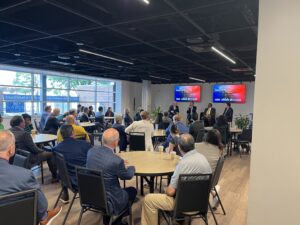The Chattanooga Chamber Foundation and the Regions Foundation, a nonprofit initiative of Regions Bank, announced ongoing support for a skills and workforce development program that serves job-seekers living in parts of Hamilton County hardest hit by unemployment before and during the COVID-19 pandemic.
Supported by a donation of $90,000 from the Regions Foundation, the Skill Up initiative provides more than 45 people with six weeks of training in advanced manufacturing, customer service, and information technology. Participants spend the first three weeks learning new skills, followed by three weeks applying them in on-the-job training.
The Regions Foundation is an Alabama-based 501(c)(3) organization funded primarily through Regions Bank contributions. The Foundation seeks to advance community initiatives that prioritize financial wellness, education and workforce readiness, and economic and community development.
“Workforce readiness programs are worthy investments that pay countless dividends in our communities,” said Marta Self, executive director, Regions Foundation. “Skill Up will dramatically change the jobs outlook for people in Hamilton County who will now have the chance to learn skills and immediately put those skills to work.”
Michael Mathis, Chattanooga market executive, Regions Bank, talked about what a difference this can make in people’s lives over a lifetime of employment.
“The Skill Up formula contains vital ingredients for success,” Mathis said. “By providing classroom training and on-the-job experience in vital industries like manufacturing and I.T., Skill Up is not only transforming careers, it’s transforming lives. Regions is proud to support this program, especially during a time when so many people and employers have experienced challenges amid the pandemic.”
Program services reach people who live in areas of high, long-term unemployment with specific outreach to East Chattanooga and the Brainerd High School footprint, which aligns with prior investments Regions Bank has made in the same area.
Christy Gillenwater, president and chief executive officer, Chattanooga Area Chamber of Commerce, said the program addresses some of the needs identified through the Velocity2040 community visioning plan and Chattanooga Climbs, the economic and talent development program developed afterward. Chattanooga Climbs is now in its second year of a 5-year plan.
“The most important thing to remember about the generous Regions Foundation investment is that it helps people secure and keep meaningful jobs,” Gillenwater said. “Chattanooga and Hamilton County have enjoyed high levels of growth and prosperity in the past several decades, but not everyone was able to secure a sustainable, good paying job. This program goes a long way toward addressing needs that our own community identified.”
Participants receive a training wage, earn industry-recognized credentials and secure full-time employment, typically at a higher sustainable wage than minimum wage. Additional Skill Up initiative partners include Chattanooga State Community College, Hamilton County Schools and United Way of Greater Chattanooga.
“The Skill-up program is exactly what our community needs to increase the earning potential and quality of life of people who are unemployed or underemployed,” said Rebecca Ashford, Ed.D., president, Chattanooga State Community College. “In a very short period, participants obtain valuable skills that employers need to meet their workforce demands. That means participants will get good jobs at the end of this short-term training.”
“I am so appreciative of our partners for helping us change lives for the better,” Ashford said.
United Way helps by surveying students to see what barriers they face, then connects participants with existing programs to help them overcome those obstacles – and focus on long-term stability and economic mobility.
For example, Building Stable Lives offers long-term life coaching and support for families with children under 18. The Neediest Cases Fund provides financial assistance to cover bills or expenses, and the Restore Hope Fund serves those experiencing hardship due to COVID-19 as well as tornadoes. The 211 hotline works great for people who might benefit from working with a case manager who can provide referrals to additional resources.
“Rebuilding the pathway to economic mobility will be crucial in the year ahead,” said Lesley Scearce, president and chief executive officer, United Way of Greater Chattanooga. “A huge step toward that end is ensuring that our workforce is stable both in the technical skills to do their job and the community resources that can support their household.”
“We are so excited to serve program participants through connecting them to the multitude of community services available to them through our 211 and Building Stable Lives programs. Our biggest desire is that they are connected to comprehensive community resources that can support them both on and off the job,” Scearce said.
For more information, see chattanoogastate.edu, UnitedWayCha.org or our community’s new website for jobs, ChattanoogaCalling.com.
Skill Up FAQ
1) Is this program a direct result of the pandemic?
While the Chamber has focused on short-term credentialing, up-skilling and reskilling programs previously, the need for opportunities for displaced or furloughed workers rapidly increased as a result of COVID-19. Many individuals in our community have been impacted, and as a result of the generosity of the Regions Foundation we have been able to execute this program for many individuals who were in dire need of an opportunity like Skill Up.
2) Who generated the idea of expanding Skill Up?
The Skill Up program has been in existence prior to the pandemic, as a partnership between the Chamber, Chattanooga State Community College, Hamilton County Schools and community partners. When funding opportunities through the Regions Foundation became available, Chamber team members immediately focused on Skill Up as we know we have talent needs in the community, and individuals in the community with a need for skills to equip them for these roles. These roles, more importantly, are with valuable employer partners and create the opportunity for upward mobility for the participants.
3) How much does it cost per student to run Skill Up?
On average, the cost of the program per person for an average size cohort is $2,200 not including wages. This includes industry certifications, classroom curriculum and costs to Chattanooga State for delivering the program.
4) How do you recruit students in a specific geographic area?
Through Hamilton County Schools and other community partners, we focused our recruitment efforts on East Chattanooga and the Brainerd High School feeder patterns. Champions within these communities, as well as the dedicated staff at Chattanooga State Community College, disseminated information to these geographic areas. These communities have experienced some of the most acute health and economic impacts of COVID-19.
5) If I am interested in participating in a future program, who do I contact?
Interested parties should contact Cynthia Brooks at [email protected]. Individuals can also visit chattanoogacalling.com to learn more about ongoing upskilling opportunities, current job postings and more. Additional contact information for the Chamber’s Talent team can also be found directly on the site which is also available in Spanish.
6) What are the requirements to participate?
In order to participate, individuals must complete 120 hours of industry-specific training and maintain attendance throughout the duration of the program. The program participants should be eager to learn and engage with the course material, and must meet employment requirements for the partnering employers in order to obtain employment upon completion of the program. Participants must also have a high school diploma or a GED.
7) Is this part of Regions’ Community Reinvestment Act commitments?
No, the funds donated by the Regions Foundation are part of their charitable efforts to support communities in the following focus areas: Economic Development, Education, Environment, Health & Human Services, and Arts & Culture.
8) How do you track students’ long-term employment success?
Prior to any cohort beginning, partners identify relevant employers who are heavily involved throughout the course of the program. These employers take part in the classroom training, and form relationships with the program participants. The Chamber and Chattanooga State remain in contact with the employer partners as the participants enter on-site training to monitor long-term success.
Additionally, the United Way of Greater Chattanooga met with program participants to identify barriers that may prevent them from long-term success, and have engaged over half of the participants in life coaching, support from 211 or other programs to provide wraparound support for these individuals.
| Image |
 |
 |
 |
 |
 |
 |






